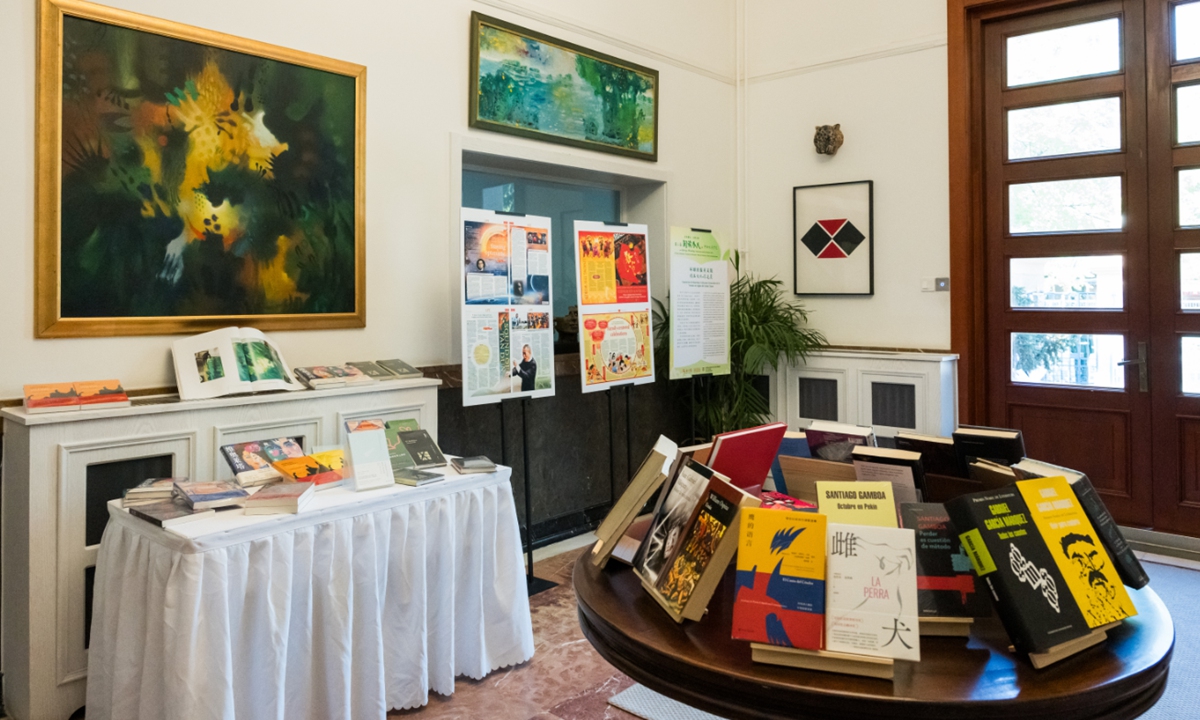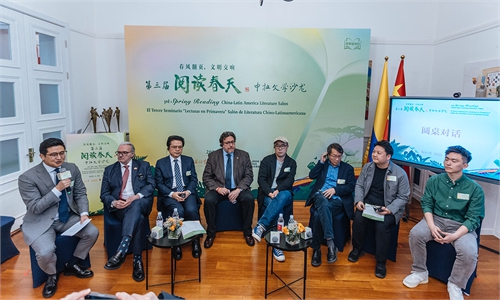ARTS / CULTURE & LEISURE
Shared literary spirit strengthens bond between readers, writers in China, LatAm
Editor's Note:
In celebration of the 30th World Book Day, the "Spring Reading" - China-Latin America Literature Salon was held by the Global Times and the Embassy of Colombia in Beijing on Tuesday last week, bringing together leading voices in literary translation and cross-cultural dialogue. Among the participants was acclaimed novelist Shi Yifeng, Lu Xun Literature Prize winner and vice chairman of the Beijing Writers Association. Shi shared his observation on Chinese people's enthusiasm for Latin American literature and how Chinese and Latin American readers deepened their mutual understanding through literature. This article is based on Shi's speech at the event.

I think that China is a nation with a profound appreciation for learning. This cultural trait is perhaps one of the reasons why Chinese readers are so eager to explore the literary treasures of other countries and cultures. Over the years, I have noticed how the Chinese audiences have shown an enduring enthusiasm for Latin American literature - a phenomenon that speaks volumes about our curiosity and willingness to engage with the world.
Being curious about the world is precious. I believe this kind of curiosity is not driven by ulterior motives; it is simply a pure desire to understand the cultures of other nations. For instance, there are constantly new Latin American literary figures gaining popularity in China, and many works that might not have high profiles in their home countries are widely welcomed here. This curiosity and thirst for knowledge have helped accumulate more creative desires and inspirations, while also strengthening the connection between China and the world.
Latin American literature has been a source of inspiration and fascination for Chinese readers. From the magical realism of Gabriel García Márquez to the poetic philosophical reflection of Jorge Luis Borges, Chinese readers have embraced these works with open arms and minds. I find it remarkable that even the most challenging works, such as Roberto Bolaño's 2666 (the novel revolves around an elusive German author and the unsolved and ongoing murders of women in Santa Teresa, a violent city inspired by Ciudad Juárez and female homicides occurring there), have found a dedicated audience in China. This novel is widely regarded as complex and demanding, yet Chinese readers approach it with the same determination as climbers ascending a steep mountain. Their persistence reflects not just a love for literature but also a profound respect for the intellectual and emotional journeys that such works demand.
As early as the 1980s, works like García Márquez's One Hundred Years of Solitude sparked a literary movement, introducing Chinese readers to the vibrant, dreamlike worlds of magical realism. These stories, with their rich narratives and deeply human themes, resonated with Chinese audiences.
One of the aspects of Latin American literature that I admire most is its courage - the courage to take the fantastical and make it feel real. This unique literary approach has had a profound impact on Chinese readers. It challenges us to reimagine the boundaries between reality and imagination, encouraging us to see the world through a different lens.
For instance, García Márquez's ability to weave fantastical elements into everyday life not only captivates readers but also inspires writers to explore new narrative possibilities. Similarly, Bolaño's sprawling, enigmatic 2666 compels readers to grapple with difficult truths, pushing the boundaries of what literature can achieve. These works remind us that literature is not merely about recounting reality but also about transforming it - daring to envision new possibilities and perspectives.

Chinese writers are also finding their voices heard in Latin America. I, too, have had the privilege of contributing to this cultural dialogue. One of my novels, which tells the story of a young woman from a rural area in China seeking a new life in a bustling city, was translated into Spanish and published in Chile. Despite the geographical and cultural distance between China and Chile, I was heartened to discover that my story resonated with Latin American readers.
I had the opportunity to connect with Chilean readers through an online book club. What struck me most during these conversations was the sense of shared experience. My novel, which explores themes of migration, urbanization and the pursuit of a better life, found a receptive audience among readers who saw parallels with their own lives and histories. This exchange reaffirmed my belief that literature, at its core, is about human connection.
One of the reasons that Chinese and Latin American literature resonates deeply with each other is the shared realities that underpin our societies. Both regions grapple with issues such as disparity between urban and rural areas and the complexities of modernization. These shared challenges have created a fertile ground for mutual understanding and dialogue.
For example, the story of a rural migrant seeking opportunities in the city is one that resonates deeply in both China and Latin America. It reflects the universal human desire for progress and the sacrifices that often come with it. By exploring such themes, we not only shed light on our own societies but also discover commonalities that unite us as human beings.
Even the most fantastical stories are, in some way, reflections of the world we live in. This is a belief I hold deeply, and it is a thread that runs through both Chinese and Latin American literary traditions.
Literature is not just an escape; it is also a mirror - a way of grappling with the complexities of life and society. This is why literary exchange between China and Latin America is so important. It allows us to share our realities, to learn from each other and to foster a deeper understanding.
In celebration of the 30th World Book Day, the "Spring Reading" - China-Latin America Literature Salon was held by the Global Times and the Embassy of Colombia in Beijing on Tuesday last week, bringing together leading voices in literary translation and cross-cultural dialogue. Among the participants was acclaimed novelist Shi Yifeng, Lu Xun Literature Prize winner and vice chairman of the Beijing Writers Association. Shi shared his observation on Chinese people's enthusiasm for Latin American literature and how Chinese and Latin American readers deepened their mutual understanding through literature. This article is based on Shi's speech at the event.

Shi Yifeng Photo: Chen Tao/Global Times
I think that China is a nation with a profound appreciation for learning. This cultural trait is perhaps one of the reasons why Chinese readers are so eager to explore the literary treasures of other countries and cultures. Over the years, I have noticed how the Chinese audiences have shown an enduring enthusiasm for Latin American literature - a phenomenon that speaks volumes about our curiosity and willingness to engage with the world.
Being curious about the world is precious. I believe this kind of curiosity is not driven by ulterior motives; it is simply a pure desire to understand the cultures of other nations. For instance, there are constantly new Latin American literary figures gaining popularity in China, and many works that might not have high profiles in their home countries are widely welcomed here. This curiosity and thirst for knowledge have helped accumulate more creative desires and inspirations, while also strengthening the connection between China and the world.
Latin American literature has been a source of inspiration and fascination for Chinese readers. From the magical realism of Gabriel García Márquez to the poetic philosophical reflection of Jorge Luis Borges, Chinese readers have embraced these works with open arms and minds. I find it remarkable that even the most challenging works, such as Roberto Bolaño's 2666 (the novel revolves around an elusive German author and the unsolved and ongoing murders of women in Santa Teresa, a violent city inspired by Ciudad Juárez and female homicides occurring there), have found a dedicated audience in China. This novel is widely regarded as complex and demanding, yet Chinese readers approach it with the same determination as climbers ascending a steep mountain. Their persistence reflects not just a love for literature but also a profound respect for the intellectual and emotional journeys that such works demand.
As early as the 1980s, works like García Márquez's One Hundred Years of Solitude sparked a literary movement, introducing Chinese readers to the vibrant, dreamlike worlds of magical realism. These stories, with their rich narratives and deeply human themes, resonated with Chinese audiences.
One of the aspects of Latin American literature that I admire most is its courage - the courage to take the fantastical and make it feel real. This unique literary approach has had a profound impact on Chinese readers. It challenges us to reimagine the boundaries between reality and imagination, encouraging us to see the world through a different lens.
For instance, García Márquez's ability to weave fantastical elements into everyday life not only captivates readers but also inspires writers to explore new narrative possibilities. Similarly, Bolaño's sprawling, enigmatic 2666 compels readers to grapple with difficult truths, pushing the boundaries of what literature can achieve. These works remind us that literature is not merely about recounting reality but also about transforming it - daring to envision new possibilities and perspectives.

A scene at the "Spring Reading" - China-Latin America Literature Salon Photo: Chen Tao/Global Times
As a writer, I find this courage deeply inspiring. It encourages me to push the limits of my own storytelling, to explore the intersection of reality and imagination, and to create narratives that resonate with readers on a profound level. It is this shared literary spirit that strengthens the bond between readers and writers in China and Latin America.Chinese writers are also finding their voices heard in Latin America. I, too, have had the privilege of contributing to this cultural dialogue. One of my novels, which tells the story of a young woman from a rural area in China seeking a new life in a bustling city, was translated into Spanish and published in Chile. Despite the geographical and cultural distance between China and Chile, I was heartened to discover that my story resonated with Latin American readers.
I had the opportunity to connect with Chilean readers through an online book club. What struck me most during these conversations was the sense of shared experience. My novel, which explores themes of migration, urbanization and the pursuit of a better life, found a receptive audience among readers who saw parallels with their own lives and histories. This exchange reaffirmed my belief that literature, at its core, is about human connection.
One of the reasons that Chinese and Latin American literature resonates deeply with each other is the shared realities that underpin our societies. Both regions grapple with issues such as disparity between urban and rural areas and the complexities of modernization. These shared challenges have created a fertile ground for mutual understanding and dialogue.
For example, the story of a rural migrant seeking opportunities in the city is one that resonates deeply in both China and Latin America. It reflects the universal human desire for progress and the sacrifices that often come with it. By exploring such themes, we not only shed light on our own societies but also discover commonalities that unite us as human beings.
Even the most fantastical stories are, in some way, reflections of the world we live in. This is a belief I hold deeply, and it is a thread that runs through both Chinese and Latin American literary traditions.
Literature is not just an escape; it is also a mirror - a way of grappling with the complexities of life and society. This is why literary exchange between China and Latin America is so important. It allows us to share our realities, to learn from each other and to foster a deeper understanding.



